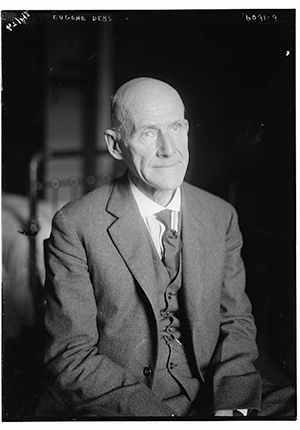Historic Document
Statement on the Supreme Court’s Verdict Upholding the Injunction (1895)
Eugene V. Debs | 1895

Library of Congress, Prints and Photographs Division
Summary
The early twentieth-century Socialist Party’s perennial candidate for President, Eugene V. Debs first gained national prominence as a labor leader in the 1890s. As president of the American Railway Union (ARU), Debs led the Pullman Strike of 1894, and attributed his conversion to socialism to the federal government’s violent role in that strike. At stake for labor was workers’ right to organize and strike on an industry-wide basis, with skilled workers lending support to the unskilled. For the emerging corporate elite and a conservative administration and federal bench, Debs and his industrial union seemed anarchy incarnate.
Working closely with the railroad companies, President Cleveland’s Attorney General sued on the government’s behalf for anti-strike decrees against Debs and the ARU. They prevailed and injunctions issued prohibiting the ARU’s members and sympathizers from quitting work in any fashion that would embarrass the railways’ operations and forbidding Debs and other ARU leaders or members from trying to persuade fellow workers to support them. Despite the governor’s insistence that law and order were well in hand at the railroad hub, President Cleveland dispatched 16,000 federal troops to Chicago to enforce the decrees. Dubbed “Gatling Gun Injunctions” in the press, the decrees were new and ominous—to sober legal conservatives as well as organized labor. They outlawed peaceful collective action and suppressed freedom of expression—all without statutory authorization; and they empowered federal judges to mete out prison terms against striking workers and their leaders without a jury trial, with “contempt of court” substituting for traditional criminal procedure and its safeguards. For a unanimous Court, Justice David Brewer reasoned that the Constitution itself was sufficient authority for the injunction and the jail terms. The Constitution did more than authorize Congress to enact laws to protect commerce and the mails on the railroads; it imparted inherent power to the executive to act against obstructions. Below is Debs’ statement in response to the ruling.
Selected by

William E. Forbath
Lloyd M. Bentsen Chair in Law, and Associate Dean for Research, The University of Texas at Austin School of Law

Ken I. Kersch
Professor of Political Science, at Boston College
Document Excerpt
I expected a favorable decision [from the Supreme Court], but I am not disappointed. After the decision by that tribunal upon the income tax bill [in Pollock v. Farmers’ Loan and Trust (1895)]. I am not at all surprised to see the decision of the lower court affirmed in our case. Both decisions are absolutely in the interest of the corporations, syndicates, and trusts, which dominate every department of the federal government, including the Supreme Court.
Jefferson’s prophecy is being literally fulfilled. The “sappers and miners,” as he denominated them, are at work undermining the federal fabric. States rights are practically eliminated, while the right of a citizen to a trial by jury of his peers as vouchsafed by the Constitution is broken down. Every federal judge now constitutes a tsar. The decision of the Supreme Court has crowned them and given them autocratic sway. They can now issue any kind of injunction restraining any man from doing anything and then deprive him of his liberty after simply going through the farce of a hearing before the same judge issuing the injunction. Railroad corporations may now reduce wages and enforce any kind of conditions upon their employees without fear of resistance. If employees see fit to quit they can be put in jail for exercising this prerogative. And this infamous outrage has now the judicial sanction of the Supreme Court of the United States.
It is notoriously true that the people of this country, except a small minority that are direct beneficiaries of such monstrous perversions of justice, have no confidence in the Supreme Court. . . . I shall abide by the decision with perfect composure, confidently believing that it will hasten the day of the public ownership, not only of the railroads, but of all other public utilities. I view it as the death knell of the wage system. In the long run this decision will prove a blessing to the country.




